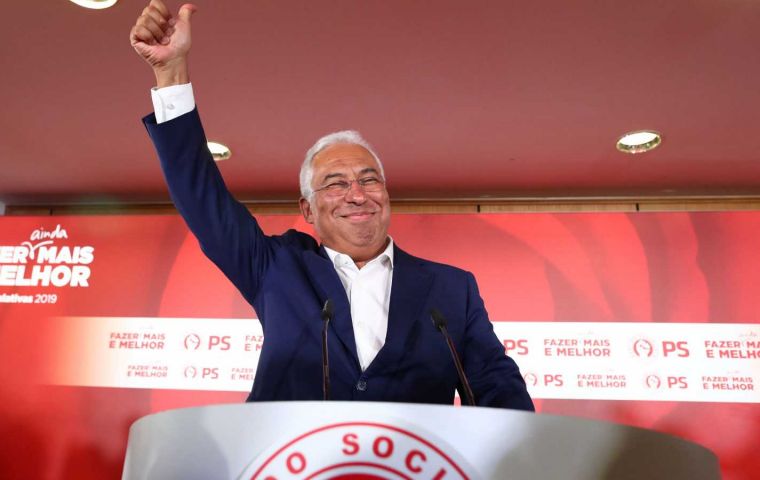MercoPress. South Atlantic News Agency
Portugal's incumbent Prime Minister and stability policies win election
 The Socialist Party (PS) took 37% of the vote, followed by the centre-right Social Democrats (PSD) with 28%, with 98% of constituencies counted
The Socialist Party (PS) took 37% of the vote, followed by the centre-right Social Democrats (PSD) with 28%, with 98% of constituencies counted Portugal's incumbent Prime Minister Antonio Costa's Socialists won a general election on Sunday after presiding over a period of solid economic growth following years of austerity, near total results showed. The Socialist Party (PS) took 37% of the vote, followed by the centre-right Social Democrats (PSD) with 28%, with 98% of constituencies counted, according to the interior ministry.
That means the PS, which has governed for the past four years with the support of two smaller hard-left parties, will increase its presence in the 230-seat parliament but still fall just shy of an outright majority once all seats in the assembly are awarded.
The results buck the trend of declining centre-left fortunes and the rise of far-right populist forces seen elsewhere in Europe.
The question now is who Costa, 58, a former Lisbon mayor, will pick as his allies to stay in power. “Whatever the result is, we must guarantee stability,” Costa told reporters just before polling stations closed and the first exit polls were announced.
After the last general election in 2015 in which the PS finished second, Costa convinced the Communists and the Left Bloc to support a minority Socialist government, an unprecedented alliance that foes nicknamed the “geringonca”, or odd contraption.
This time the Socialists have alternatives, political analyst Pedro Norton told public television RTP. “This is an incentive for it to govern alone, by searching for ad hoc agreements” when it wants to pass laws, he said.
The Left Bloc, which finished third with nearly 10% of the vote, said it was willing to once again back the Socialists.
“The Bloc is ready to negotiate an agreement that guarantees stability for the country,” the party's leader Catarina Martins told a news conference.
The election gave Costa another potential governing partner as the upstart People-Animals-Nature party (PAN) won three per cent of the vote.
After coming to power in 2015, Costa undid some of the unpopular austerity measures introduced by the previous PSD-led government in return for a €78-billion (US$85 billion) international bailout that kept finances afloat after Portugal was clobbered by the euro zone debt crisis.
Taking advantage of the global economic recovery, he reversed cuts to public sector wages and pensions while still managing to bring the budget deficit down to nearly zero this year - the lowest level since Portugal's return to democracy in 1974.
On his watch Portugal's economic growth was higher than the European Union average in recent years - 2.4% in 2018 - while the jobless rate fell to 6.4%, the level before the debt crisis, but critics complain of low salaries, job insecurity and soaring property prices amid a tourism boom.




Top Comments
Disclaimer & comment rulesCommenting for this story is now closed.
If you have a Facebook account, become a fan and comment on our Facebook Page!